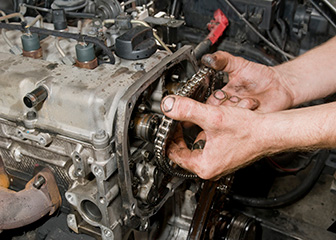So it is for the mechanic as well. If the "check engine" indicator is lit, then a mechanic can plug into the car's computer and get a code or codes that caused the indicator to blink or shine vague and steady. Once the mechanic has the codes, he can look these up in to see what the problem is. This process may lead to the exact problem, or it may lead to a problem the computer senses from its pre-programmed monitor "brain." What is missing here is intuition, experience, and human judgement. A car computer cannot see, hear, smell, or feel the parts of the engine that may be suspect. An experienced master mechanic used to be able to sense these subtleties of the car by drawing on deep tactile knowledge of cars and how they run. Today's mechanics plug in and are taught to "fix by numbers."
This leads to Matthew Crawford's claim that we long to have a better sense of the world through handling and knowing tangible objects. That if we deal totally in abstractions that we have lost some (literal and figurative) sense of the world:
If thinking is bound up in action, then the task of getting an adequate grasp on the world, intellectually, depends on our doing stuff in it. And in fact this is the case: to really know shoelaces, you have to tie shoes. (164)To really know something, to really experience something, you have to get your hands dirty . . . and like it . . . and then come back for more. If experiences are held at an arms-length abstraction, such as the details of my car either to me or my mechanic, then we can never really know. We leave this element of thinking to a computer to do for us. Sure not everyone wants to be an auto mechanic, but what about other elements in life?
Matt Crawford sees a world heading for an abyss of abstraction and dependency. He is calling for audiences to take a step back to figure things out by hand. Are we losing our grasp on the fast-changing world around us, happy to have the latest technology in hand that we become ever more dependent on? What happens when the internet goes down? What happens when my car won't start? What happens when we lose a sense of the concrete?



I agree with the fact that in order to "know something, to really experience something, you have to get your hands dirty." Technology has been improving a lot over the years and many machines have started doing things that we used to do. One day we won't do anything for ourselves because we will have machines to do it all.
ReplyDeletePersonally, I agree with Matt Crawford. I think our generation, along with future generations will grow to be lazy, and take things for granted. I admit that I do the same, but it's because I've grown so used to the technology in my environment! I'm surrounded by machines that practically do everything for me. I don't even realize how much my laptop, phone, or car does for me. It's ridiculous to even think our grandparents had to manually do everything. Although technology is greatly improving, it's making our future generations lazier, causing them to be more dumb. They'll be a day in the future where we probably won't even have to get up. It reminds me of the movie Wali, and how the characters were larger in size and they had a lack of knowledge.
ReplyDelete